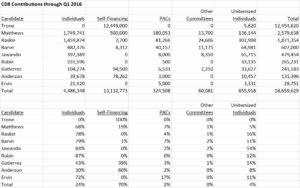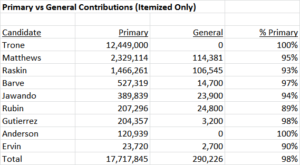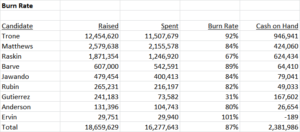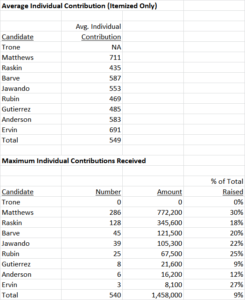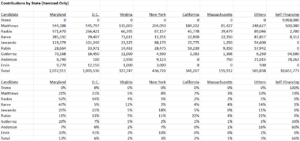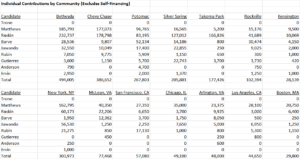By Adam Pagnucco.
Last October, we summarized fundraising in Congressional District 8 through the third quarter of 2015. Today, we present updated numbers incorporating campaign finance reports through April 6, 2016, which are the last reports due before the primary.
First, let’s look at the top-line numbers by category.
Total Wine co-owner David Trone stands out. His $12.5 million in resources, almost entirely self-funded, accounts for 67% of all money in the race. Trone has set the all-time nationwide record for self-funding in a U.S. House primary and his financing approaches the range of recent major candidates for Maryland Governor.
Former WJLA anchor and Marriott executive Kathleen Matthews and Senator Jamie Raskin have both done well. At the beginning of the race, many observers were predicting that it would take $2 million to win, and both Matthews and Raskin are roughly at that mark. If it were not for Trone, their financial performance would be attracting more comment. The other candidates combined have accounted for 9% of the election’s funding and face steep challenges to be heard. (Dan Bolling’s report has not been filed as of this writing, so his numbers are not included here.)
Unlike state and county contributions, federal contributions must be designated for the primary or the general. The candidates have collected relatively little general election money and their budgets are almost entirely available for the primary.
Burn rate, which is the percentage of money raised that has been spent, is not a terribly meaningful statistic at this point. Most of the candidates’ money is gone now with the exception of Delegate Ana Sol Gutierrez, who can afford some late mailers if she wishes. But Trone and Matthews have additional self-financing capacity, and even Raskin can self-fund to a limited extent. (So far, he has given himself just $2,700.) Additionally, this statistic is affected by the timing of bill payments. Candidates who pay late look better on cash-on-hand than those who pay early. Note: Trone’s raised figure includes the two self-funding contributions he made last week, but his cash on hand applies to April 6. That makes his data not strictly comparable to the other candidates, but at this point, he and the others are spending as fast as they take money in.
The maximum allowable individual contribution is $2,700 per election, both primary and general. Matthews leads in this category. Thirty percent of her fundraising has come from maximum checks and her average individual contribution is the highest in the field. Raskin has the smallest average individual contribution, but that does not include his lead in unitemized contributions of $200 or less. There’s no way to tell from the campaign finance reports how many of those small contributions he has received, but they total over $300,000. Raskin is the race’s small dollar leader.
In terms of geography, large amounts of out-of-state cash have been flowing into CD8. Excluding self-financing and unitemized contributions, only Raskin has received a majority of his contributions from Maryland while Delegate Kumar Barve is close at 47%. Nearly half of all money from Marylanders in this race has gone to Raskin. Matthews, Gutierrez, Will Jawando, Joel Rubin and Dave Anderson have all received less than a third of their contributions from Marylanders other than themselves. Rubin’s take from California is more than double his receipts from Maryland. Matthews’ number one location of contributions is the District of Columbia and she leads in receipts from the District, Virginia, New York, California and Massachusetts.
Here’s a breakdown by locality, both inside and outside the district. Matthews leads in funding from Potomac and is basically tied with Raskin in Chevy Chase, while Raskin leads in Bethesda, Silver Spring, Rockville, Kensington and Takoma Park (the latter by light years). Matthews dominates in fundraising from large localities outside the district. She has raised more than three times as much money from New York City as she has from Silver Spring, Takoma Park, Rockville and Kensington combined.
This data makes clear the fundraising strengths of CD8 candidates. Trone is self-funding A LOT. Matthews has tapped into a large monetary base combining national level Democrats, PACs and business money. Raskin has national and PAC money too, but most of his financing is local and much of it is small dollar. All three have the resources they need to win. Given the fact that these three account for 91% of the funding in this race, it’s hard for the other candidates to break through.

